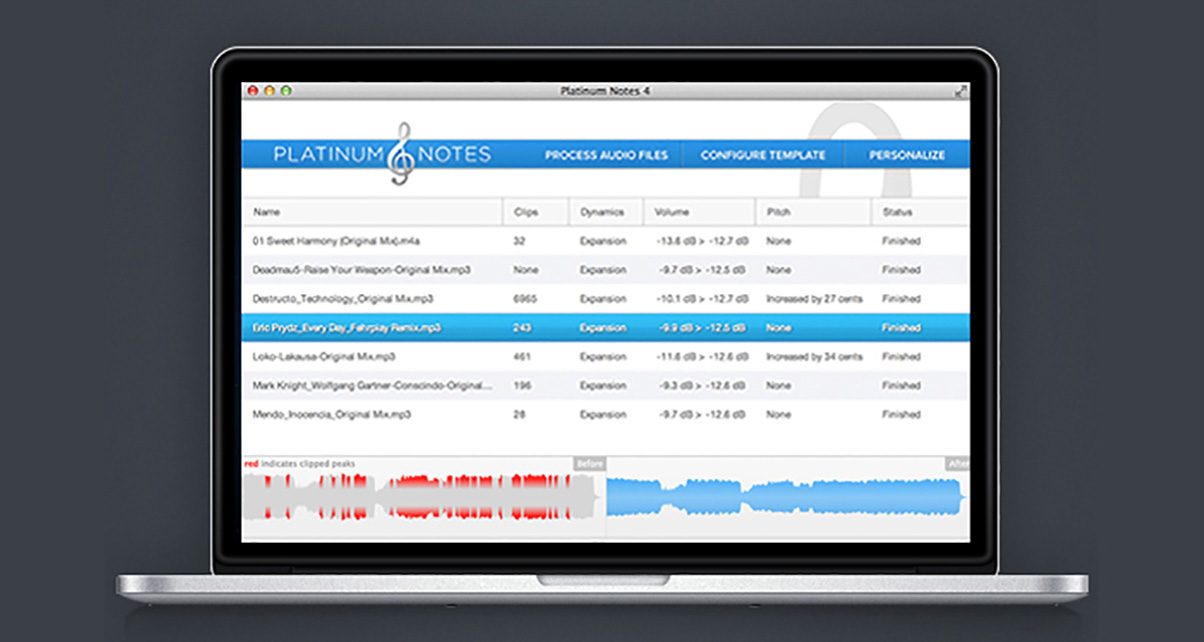
Platinum Notes 4 is the first update to the music file improvement software from Mixed In Key in more than two years. For the uninitiated, Platinum Notes is designed to batch analyse all of your music files and make overall improvements to them like correcting volume differences, tightening up the bass drums, removing digital clicking, and correcting key discrepancies.
While some people baulk at the idea of letting software “automatically master” their music, others swear by the results Platinum Notes gets them – and the new version (review coming soon), has added a beguiling extra feature in the shape of a “warmth” filter, designed to add back some of the warmth allegedly lost from music in the switch from vinyl to digital.
We caught up with Yakov Vorobyev, the man behind both Platinum Notes and Mixed in Key, to ask him some of the questions you have asked us over the years since the last version dropped about music mastering and what Platinum Notes can (and can’t) do:
What is the main purpose of Platinum Notes?
To me, Platinum Notes is a guarantee that every file in my music collection will sound great on a loud sound system. It’s software designed to improve your tracks by giving the same volume and excellent contrast between quiet and loud parts. You’ll enjoy perfect audio files without any clipping or distortion.
Who is using it, and what for?
Platinum Notes is made for DJs. Speaking from personal experience, I get my tracks from different sources. I download promos from SoundCloud, and get lots of music from Beatport, Traxsource, Amazon and iTunes. None of them have equal volume, and many tracks have clipped peaks. This is not Beatport’s fault, they just sell the tracks that music labels provide to them. Our goal was to make MP3s and WAVs from different labels sound perfect together.

My music collection is all 320kbps MP3s and 256kbps AACs. Will it improve those?
Most of my collection is 320kbps MP3s and uncompressed WAV files, and Platinum Notes works perfectly on them. In fact, we recommend that DJs buy WAV files and run them through Platinum Notes, since that provides the best source material.
Can it be trusted to fix things about my music files automatically, or should I be listening to them too?
I trust it to work automatically. This is our fourth generation product, so it’s stable and mature. The first version came out six years ago, so we’ve improved a lot over that time. Once you drop in the first 10 files, you’ll understand very quickly what it’s doing and you will trust the results immediately.
I don’t like the idea of applying something automated to my music without understanding what it’s doing – can you tell me in detail what exactly Platinum notes does when it processes a file please?
First, the file is decoded to an uncompressed WAV. Second, Platinum Notes analyses the volume of the file with our special algorithm that pays attention only to the drums. The benefit of drum analysis is that all your output files will have the same drum volume, which is really nice for beatmatching.
Next, it detects any clipped peaks, and fixes them with a combination of an iZotope multi-band audio processor, and our custom algorithm for clipped peak repair. It makes your music sound smoother and less distorted. After that, Platinum Notes adds warmth using an iZotope Exciter.
We have three settings: “No Warmth”, “Gentle Warmth” and “Hot vacuum tube”, which regulate the intensity of the effect. Gentle Warmth is like sitting by the pool in Ibiza during the summer. Hot vacuum tube is like listening to an old vinyl record at a record store. Both are good settings, but we recommend the “Gentle” setting for most DJs. Any pitch problems are fixed during processing as well.
Finally, Platinum Notes adjusts the volume of the output file by using another iZotope filter called IRC Limiter. It’s an elite-quality plugin that makes music louder without clipping it.
I want to point out that Platinum Notes never overwrites your original files. It creates new tracks with a slightly different filename, so you’ll know which ones have been improved. There’s no danger of messing up your music.
Can you explain “decode to an uncompressed WAV”, please?
Platinum Notes decodes to a high-quality WAV so it can work with the highest-quality material during the processing phase. It keeps the music sounding crystal clear without any artefacts. I think it’s important to use high quality source material because it gives Platinum Notes more room to recover the quality.
I can think of a photography analogy. Imagine trying to print a beautiful poster for your wall. If your source file is a low-resolution JPEG, the poster will look fuzzy. If your source is a large RAW file from a top-quality DSLR camera, the poster will look crystal clear and beautiful. We recommend using WAV files for source material because they give Platinum Notes more room for improvement.
What did you get asked for the most with regards to the version, and have these changes been made in the latest version?
We added the new “Warmth” filter since it’s a really valuable tool for DJs. It’s nice to get a little bit of that “vinyl” sound without damaging the audio quality. We also updated the user interface so it’s easier to see the results of processing for each file. It feels good to look at Platinum Notes processing hundreds of tracks.
What other benefits/advantage does Platinum Notes have on top of those mentioned above?
It saves you a ton of time. I used to open my files in Sound Forge and edit each one using a combination of different audio plug-ins. It took forever. Platinum Notes can process thousands of my files without any effort – I just add my tracks, click “Start Processing”, and the whole thing gets done automatically. The typical “Auto-Gain” functionality in iTunes and Traktor cannot come close to what Platinum Notes does for each file.
What “big names” are using and endorsing the product?
Pete Tong’s a fan, and so are thousands of other Mixed In Key customers. People use it all over the world and it’s growing every day.
Who “ear tested” it? Whose job was it to listen to and tune the results being obtained from the software when you were developing it?
Recently, we hired two audio engineers in Miami to audit our algorithm and suggest improvements. Unfortunately, they agreed that the official template is as good as it gets. We were hoping for some new ideas. As a result of our audit, we decided to create a second template called “Festival” that has a little more “air” in the hi-hats. It has the perfect balance of bass and hi-hats for me: I use it on all my tracks.
Why is it so expensive?
Platinum Notes is like the Rolls Royce of audio mastering. We use three different iZotope filters, a pitch correction filter from a highly respected German company, and several of our own algorithms. It’s crammed with studio-grade plugins and algorithms, so $98 is a very reasonable price.
• The new version of Platinum Notes is available at US$98 now.
Do you use Platinum Notes? What’s your experience of the software? if not, would you be tempted to? Please share your thoughts in the comments.








